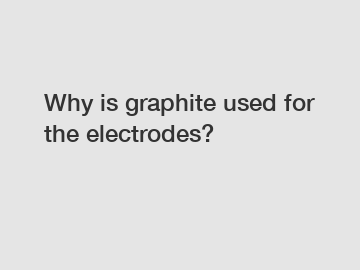Jan. 07, 2024
Minerals & Metallurgy
Hengjingming Product Page
Why is graphite used for the electrodes?
Graphite has long been recognized as a valuable material for various purposes owing to its unique properties. When it comes to electrodes, it is widely employed due to its exceptional conductivity, durability, and stability. In this article, we will delve into the reasons why graphite is the go-to choice for electrodes and explore its numerous applications across multiple industries.

1. Conductivity: One of the primary reasons graphite is used for electrodes is its high conductivity. The structure of graphite consists of layers of carbon atoms arranged in a hexagonal lattice. This arrangement allows for the easy movement of electrons, making graphite an excellent conductor of electricity. This property is crucial in applications where efficient transfer of electrical current is required, such as in batteries, fuel cells, and electrolysis processes.
2. Durability: Graphite is renowned for its exceptional durability, even under extreme conditions. Its molecular structure provides resilience against heat, chemical reactions, and mechanical stress. These properties make it an ideal choice for electrodes in high-temperature environments found in applications like arc furnaces, electric arc welding, and metal refining processes. The ability to withstand intense heat and maintain its structural integrity allows graphite electrodes to have a longer lifespan compared to alternative materials.
3. Stability: Graphite electrodes possess remarkable chemical stability. They are highly resistant to corrosion and do not readily react with many chemicals. This stability is essential in applications where electrodes come into contact with corrosive substances, such as in chemical manufacturing or electroplating processes. The use of graphite ensures that the electrodes remain intact and unaffected by the surrounding environment, ensuring consistent performance over extended periods.
4. Low friction: Another significant advantage of graphite is its low coefficient of friction. This property allows for smooth and consistent movements in sliding applications, such as electrical contacts or sliding electrical brushes. The low friction reduces wear and tear on the electrode surface, leading to increased longevity and reduced maintenance costs.
5. Versatility: Graphite is a highly versatile material, offering a range of customizable options in terms of size, shape, and composition. Electrodes of various dimensions can be easily manufactured to suit specific requirements, from large-scale industrial applications to intricate designs in small electronic devices. Furthermore, graphite electrodes can be modified by adding impurities or altering their structure to enhance their performance in certain applications. This versatility allows for tailored solutions across different industries, including electronics, aerospace, energy storage, and more.
In conclusion, graphite is used for electrodes due to its exceptional conductivity, durability, stability, low friction, and versatility. These properties make it the material of choice in a wide range of applications, including electrical systems, metallurgy, chemical manufacturing, and more. Its ability to efficiently conduct electricity, withstand harsh conditions, and resist corrosion ensures optimal performance and extended lifespan. Furthermore, the low coefficient of friction and customizable options make graphite electrodes adaptable to various sizes and shapes for different industry needs. All in all, graphite's unique properties prove why it remains a popular choice for electrodes in multiple sectors.
Please visit our website for more information on this topic.
Want more information on Peach Shell Activated Carbon? Feel free to contact us.
Previous: What is the use of chamfer strip?
Next: NiCr in Batteries: Why is this Alloy Revolutionizing Energy Storage?
If you are interested in sending in a Guest Blogger Submission,welcome to write for us!
All Comments ( 0 )